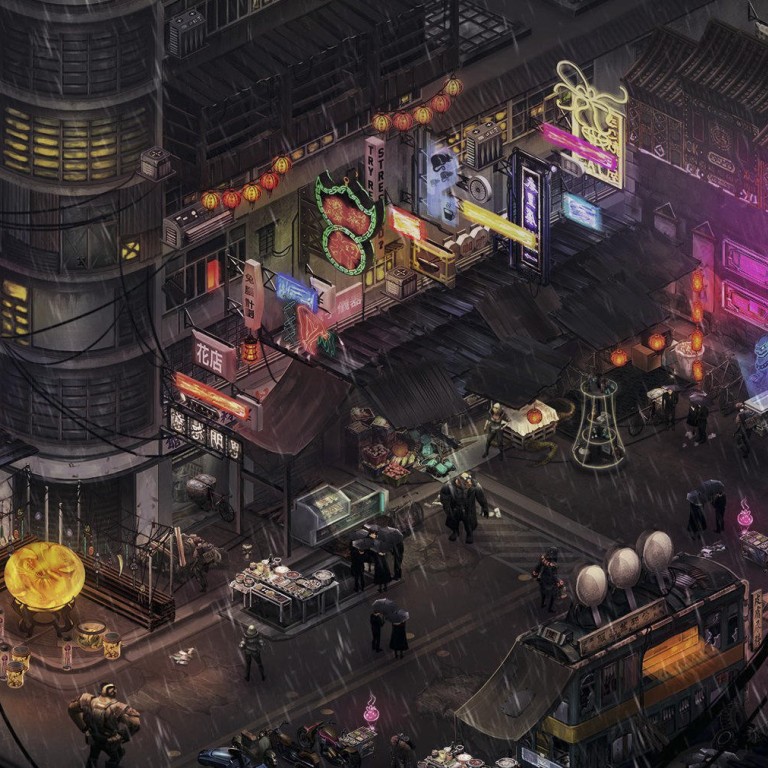
In Shadowrun: Hong Kong, the city finally gets the video game treatment it deserves
The latest instalment of the long-running RPG envisions Hong Kong 2056 as a retro-futuristic cyberpunk landscape, drawing on myth and history to deliver an enthralling experience


Hong Kong doesn't get much love in the video game world. Despite the city's stunning -like aesthetics, action-heavy cinematic culture and history steeped in folklore, the 852 often gets passed over for virtual versions of New York, London and Tokyo. But that is starting to change.
from 2012 was the first major sign, an aptly titled sleeper hit/underdog open-world game that later this year will spawn the much-awaited spin-off, . And since that release, the city has cropped up in numerous big-name franchises: and .
might be the true turning point though. It's the first major series to offer up the metropolis as a viable selling point. But the game initially didn't seem a likely prospect: developer Harebrained Schemes struggled to complete the game on its allotted budget, eventually turning to Kickstarter to crowdsource the necessary US$100,000. The goal was met in mere hours, and the campaign ended with more than a million dollars in the bank. Who said gamers don't dig our little city?
This third entry is the natural progression of a series that started life as a tabletop game in the late 1980s - you know, those ones where you had to actually sit around a table with real people and imagine things based on dice rolls. Visually simple but highly complex, the video game versions are RPGs for connoisseurs: top-down, turn-based PC adventures with lots of reading involved and occasional bursts of action. Think meets - or for those of you who don't get those references, think a mishmash of that ultimate dork duo, and .
The appeal here, as with the purest of RPGs, is true escapism: endless customisation to focus specifically on what you're good at, in a world built exactly to accommodate you. You kick off by creating a character from a variety of classic fantasy races (human, elf, dwarf, orc) and sci-fi classes (samurai, shaman, hacker). Then it's on to the story, the standard opener where your character is invited to a new city (Hong Kong), only to find your friend dead, yourself framed, and the hunt for their killer on.
That's where the stereotypes end, though - for the most part, at least. Writing is key to the game's arc and it's in the text-based storytelling that truly shines. Hong Kong's main campaign is heavily based on the mythical history of our own hometown, a "mysteries of the orient" scenario where double-crossing civil engineering conspiracies are balanced against feng shui leanings that take superstitions to the extreme.

It's set in 2056, and the city is as embellished and exaggerated as the rest of the fantastical game, a ramshackle rendering where the Kowloon Walled City is still up and running, half the population seemingly lives on the fringes of society, triad gangs run rampant, and neon signs are so ubiquitous that they might as well be supporting characters.
That might sound a little cliched on paper, but the game's retro-futuristic cyberpunk aesthetics blend perfectly with this nostalgic, dream-like version of the city. In particular, those with a penchant for real life late-night wanderings through Hong Kong's darker parts will get a kick out of roaming through the beautifully bleak virtual world.
But a stage isn't much without its players, and the game does a great service to the city by cleverly weaving its characters into a gratifying tapestry. Whether it's your orc half-brother, the Russian rigger with a dangerous pet drone or the ghoul samurai with a taste for human flesh, each plays a pivotal role in building a strong network between your protagonist and all those he encounters.
Rather than driving development through obvious dialogue, conversations are branched in a system that makes characterisation its own mini-game. Eventually, you'll even be optioned to join in the other characters' troubles - that could be something as simple as a revenge mission, or as unique as stealing Kowloon childhood memories that were long ago sold on the black market.

Choosing to take part in them, or sticking with the main story, offers a similarly varied mission structure, one where multiple methods can be utilised to complete your objective. That's always given the edge over similar RPGs, but in Hong Kong that sense of potential is fully realised. There are times when guns will blaze, sure, but also times when you charm your way past a receptionist, sneak past a guard, or maybe hack into systems to complete your task from afar.
Each requires a certain number of acquired skills from both your character and your team. Choosing violence might seem like the simplest approach, but it mostly ends in disaster, and as you near the end of the 20-to-30 hour campaign, the mission structure becomes a tactical case of balancing your group's particular abilities against the many clever obstacles in your path.
doesn't break the mould in terms of the series' RPG dynamics. Far from it, in fact; the game builds on previous incarnations to create a world that feels more fully realised than ever before. At times, conversations can drag on to the point of frustration and point-and-click controls just won't do what you tell them, but they're minor complaints when set against the game's setting.
Which is to say, it's the Hong Kong behind that makes it unique. We're possibly biased, but the city's age-old mythological traditions can't be ignored. Rather than taking the easy route and playing the traditions for humour, gives them the respect they so thoroughly deserve, and in turn, offers a game thick with lore and intrigue. We're not saying a new wave of games should be set in Hong Kong - we're just saying it wouldn't be so bad if they were.
Harebrained Schemes)
